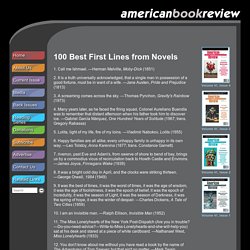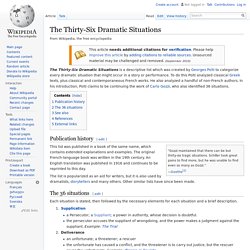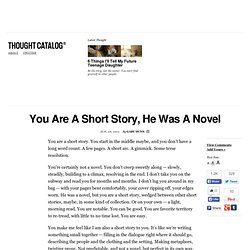

Authorship. Story writing. American Book Review. 1.

Call me Ishmael. —Herman Melville, Moby-Dick (1851) 2. It is a truth universally acknowledged, that a single man in possession of a good fortune, must be in want of a wife. —Jane Austen, Pride and Prejudice (1813) 3. 4. 5. 6. 7. riverrun, past Eve and Adam's, from swerve of shore to bend of bay, brings us by a commodius vicus of recirculation back to Howth Castle and Environs.
The Thirty-Six Dramatic Situations. The Thirty-Six Dramatic Situations is a descriptive list which was created by Georges Polti to categorize every dramatic situation that might occur in a story or performance.

To do this Polti analyzed classical Greek texts, plus classical and contemporaneous French works. He also analyzed a handful of non-French authors. In his introduction, Polti claims to be continuing the work of Carlo Gozzi, who also identified 36 situations. Publication history[edit] “Gozzi maintained that there can be but thirty-six tragic situations. This list was published in a book of the same name, which contains extended explanations and examples.
The list is popularized as an aid for writers, but it is also used by dramatists, storytellers and many others. The 36 situations[edit] Each situation is stated, then followed by the necessary elements for each situation and a brief description. See also[edit] References[edit] External links[edit] You Are A Short Story, He Was A Novel. You are a short story.

You start in the middle maybe, and you don’t have a long word count. A few pages. A short arc. A gimmick. Some terse resolution. You’re certainly not a novel. You make me feel like I am also a short story to you. I know this, because he was a novel. You are more like: writing in the lines, in the margins, in the sides of notebooks. My short story is about a young girl, too young, who wasn’t ready to read everything that was handed to her, everything she bought from miles of books in a dusty, old used book store, everything she unknowingly, naively checked out of the library.
He was a novel, sure. Tagged Books, Break ups, Commitment, Dating, Familiar, Fear of Commitment, Fiction, haruki murakami, Hook Up, Lit, Literature, Long Term Relationship, Love & Sex, loxe-sex, norwegian wood, Novels, Reading, Relationships, Short Stories, Words. The Hemingway Papers. 25 Things You Should Know About Character. Previous iterations of the “25 Things” series: 25 Things Every Writer Should Know 25 Things You Should Know About Storytelling And now… Here you’ll find the many things I believe — at this moment!

— about characters: 1. Without character, you have nothing. 2. A great character can be the line between narrative life and story death. 3. Don’t believe that all those other aspects are separate from the character. 4. The audience will do anything to spend time with a great character. 5. It is critical to know what a character wants from the start. 6. It doesn’t matter if we “like” your character, or in the parlance of junior high whether we even “like-like” your character. 7. It is critical to smack the audience in the crotchal region with an undeniable reason to give a fuck. Paul Auster: Why Roth Is Wrong About the Novel. Kanal von learnstorytelling. World Public Library: Fairy Tales: Their Origin and Meaning.
Facebook Storytelling. Memorable posts. Methods. Tools that fit.